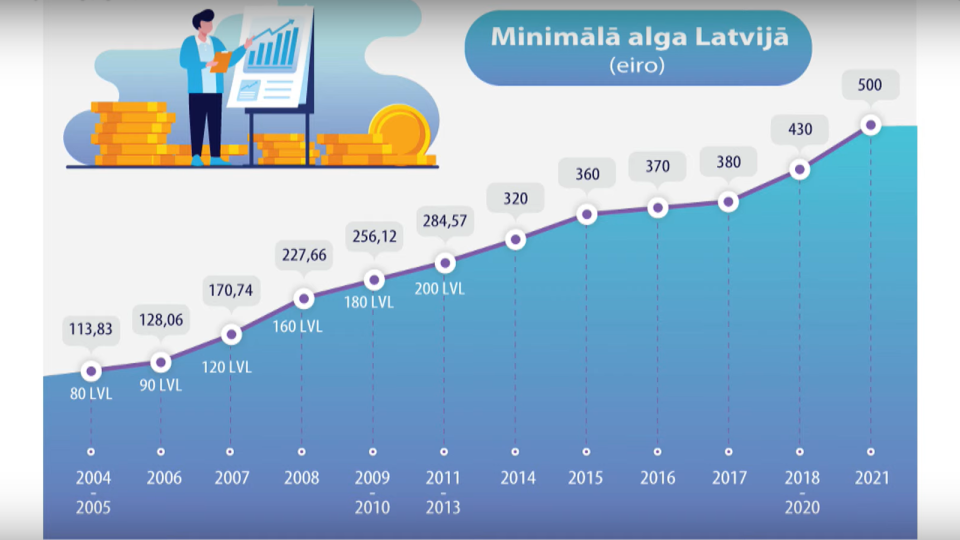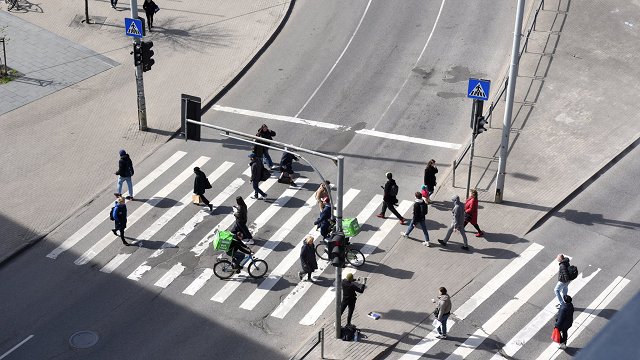At the end of October, the amendments to the final reading of the Labor Law were adopted by the Saeima, while the President of Latvia, Egils Levits, also announced them officially on November 11, despite the Latvian Employers' Confederation (LDDK) sending a request to the President not to announce the changes to the law, citing non-standard and unsustainable practices in the drafting of the law.
The minimum wage is being raised to reduce poverty risks in the face of price increases and to improve the competitiveness of businesses with Lithuania and Estonia, where the minimum wage will be higher next year than in Latvia. In Lithuania, the minimum salary will be €800, and in Estonia €725 per month.
The Chairman of the Board of the Latvian Chamber of Commerce and Industry (LTRK), Jānis Endziņš, is in two minds about the decision on raising the minimum wage. On the one hand, prices and inflation are rising, so increasing the minimum wage is important, on the other hand, the issue has to be seen in the government along with the next year's budgets.
"It is unfortunately [..] not so simple that, with an administrative method of raising the minimum wage, the economy is sorted out [..]. You must be able to produce a product or provide services, you must earn the money, and then you can pay it in wages. The competition in the export market is not easy at the moment, knowing that there are already huge increases in electricity costs, gas costs, heating costs and so on and so on. And in Rīga, it's a smaller blow, but particularly in the regions, there are companies with a greater proportion of minimum wages and [..] it will be a very important challenge for many companies to survive at all. If there is a genuine desire to help citizens, it is better to raise the untaxed minimum when people simply have more money on hand,” said Endziņš.
Gints Kaminskis, president of the Latvian Association of Local Governments, said that raising the minimum wage to €620 per month from the municipal budget will cost an additional €35 million, while the remuneration should also be raised for people whose salaries are not much higher than the minimum wage.
"First, of course, inflation makes it difficult for people to make the necessary payments, including purchasing the necessary foods, and raising the minimum wage is necessary. At the same time, it should be said that there are enough employees at the minimum wage. If the minimum wage with January 1 is €620, only to provide that, more than 34 million extra is needed in municipal budgets. It is also necessary to talk about the non-taxable minimum, and it is also necessary to do so for other employees working daily in municipalities [..]. There are specialists, whether they are library managers, cultural workers, those who have actually been very close to minimum wages, but their wages must also rise, and that will require additional funds in municipal budgets," said Kaminskis.
State audit officials have indicated that work should be more efficient and that, instead of two people working at a minimum wage, one should be employed with higher wages and more responsibility. Andrejs Migunovs, economist at the Bank of Latvia, believes that the minimum wage must be raised and it will also help to reduce the income gap between citizens, but this should be done gradually.
“If we raise minimum wages too much, then that means that actually a company, for example, will not make some kind of investment and then, in the long run, will lose something to a more efficient company that is able to offer something better quality and cheaper. In some industries, such as the hospitality sector, which suffered from Covid and from geopolitical events, it could look into some sort of opportunity even to lay off employees to be able to pay their minimum wage to others. There could be the opposite effect that management is trying to increase income for those people earning less, but as a result, it might be that some of those people will remain without income at all. We could say at once, of course, that the minimum wage is EUR 1,000 or even more, but companies will simply not be able to provide the wages, they will lose both competitiveness and solvency,” Migunovs said.
The European Parliament adopted a directive on adequate minimum wages this autumn. The minimum wage will be set by each Member State itself, but within two years the minimum wage should be 50% of the average gross salary in the country. At present, the highest minimum wage in the EU is in Luxembourg – EUR 2,257 per month and in the lowest in Bulgaria – EUR 332. Until now, in Latvia, the minimum wage was the second lowest in the EU - 500 euros per month.




























